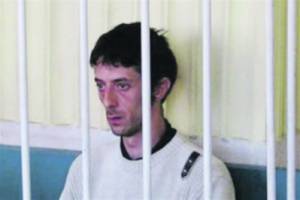Mustafa Dzhemiliev’s hostage son punished in Russian captivity

Unable to touch Crimean Tatar leader Mustafa Dzhemiliev, Russia is imposing inhuman conditions on his 33-year-old son Khaiser whom it continues to hold hostage, in an Astrakhan prison.
According to Khaiser’s lawyer Nikolai Polozov, Khaiser has for the second time been placed in a punishment cell. The supposed ‘offence’: out of physical emaciation, he often falls asleep and this is not allowed.
According to his mother, Safinar Dzhemilieva, he has to stand in a damp and unheated solitary cell all day and is only allowed to lie down at night. He gets one meal a day – like in Soviet times, his mother says, bitterly.
Khaiser was moved to Astrakhan two months ago, almost certainly as punishment for the Crimean Blockade which his father initiated. This is illegal even according to Russian legislation which stipulates that he should be imprisoned either according to his place of residence, Crimea, or in the Krasnodar region where the trial took place. Russia has shown the same contempt for its own legislation with regard to Gennady Afanasyev, who was sent to the Republic of Komi after courageously retracting testimony tortured out of him against Ukrainian filmmaker Oleg Sentsov.
So far only his lawyer has been able to see him. His mother hopes to visit him, but there has to be an ‘invitation’ from the authorities.
Khaiser has a year to serve of the sentence imposed, and although his parents plan to seek his early release, they have few illusions. It is not only they who are in no doubt that Russia is holding Khaiser as a hostage.
Mustafa Dzhemiliev has repeatedly accused the Kremlin of open blackmail by holding his son in prison. The 71-year-old former Soviet dissident spent 15 years in a Soviet labour camp, and has now, under Russian occupation, been banned from Crimea and Russia, meaning that he cannot even visit his son.
In May 2013 Khaiser Dzhemiliev shot and killed Fevzi Edemov who was working as a guard to the family. All the evidence indicated that this was a tragic accident, and that the correct charge should be of manslaughter through careless use of firearms.
It was under Viktor Yanukovych’s presidency that attempts were first made to use the case against Khaiser to blackmail Mustafa Dzhemiliev threatening to change the charge from manslaughter to murder. These attempts were continued by Russia following its annexation of Crimea.
In the meantime the Ukrainian authorities passed the case to the Kyiv prosecutor on the basis of the Ukrainian Law on the Occupied Territory. An application to reinstate the original manslaughter charges was allowed, and two Kyiv courts subsequently ruled that Khaiser should be released from custody.
Since these rulings were ignored, Mustafa Dzhemiliev approached the European Court of Human Rights, which on July 10, 2014, ordered Khaiser Dzhemiliev’s release. Instead of complying with the Court in Strasbourg, Russia moved the young Ukrainian to the Krasnodar region in Russia. It also tried to charge Khaiser with murder “out of hooligan motives”, as well as with stealing and keeping a weapon and ammunition.
A Ukrainian court passed sentence in April 2015, with Khaiser’s extradition then immediately demanded, yet ignored, despite all legal requirements under joint agreements being fulfilled.
There was a cheering moment at the end of May when a Russian jury rejected the charges of murder which Russian investigators had insisted on bringing. The jury found Khaiser Dzhemiliev guilty of manslaughter through carelessness and of illegal possession of a weapon, as had the Ukrainian court. It considered that he was worthy of leniency over the charge of possessing a firearm.
The prosecutor ignored this and demanded a 5 year sentence which the court obligingly provided. The Supreme Court, however, reduced this to 3.5 years.
Another example of legal nihilism in this case, as in that of Sentsov, Kolchenko and Afanasyev, is that Russia is claiming that the men ‘automatically’ became Russian nationals as a result of Russia’s invasion and occupation of Crimea.
All remain Ukrainian nationals whom Russia is legally obliged to return to Ukraine.





